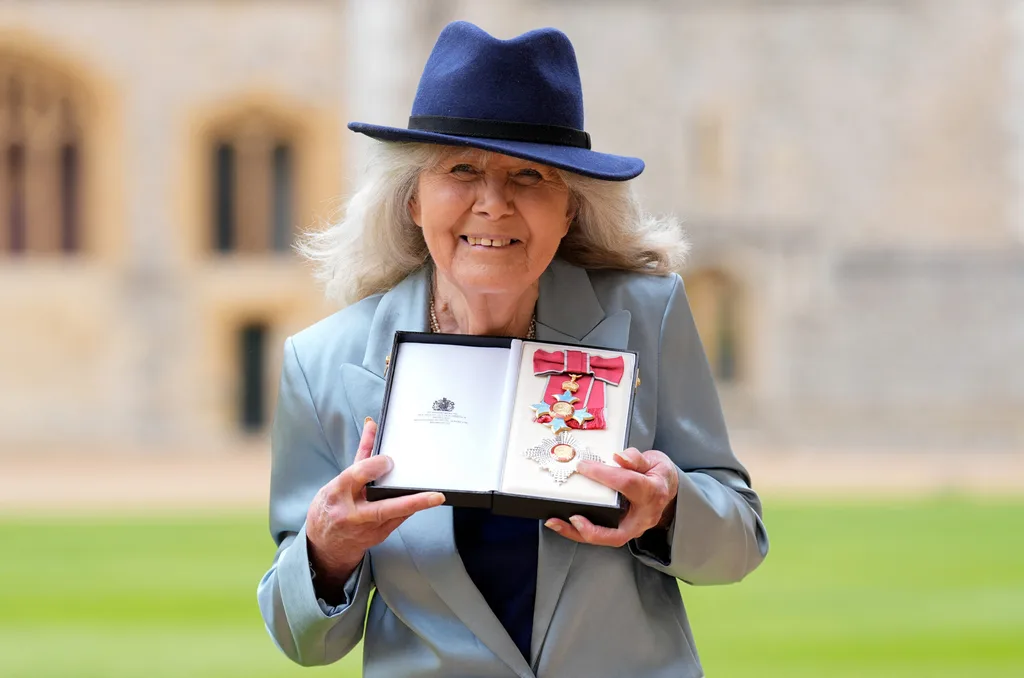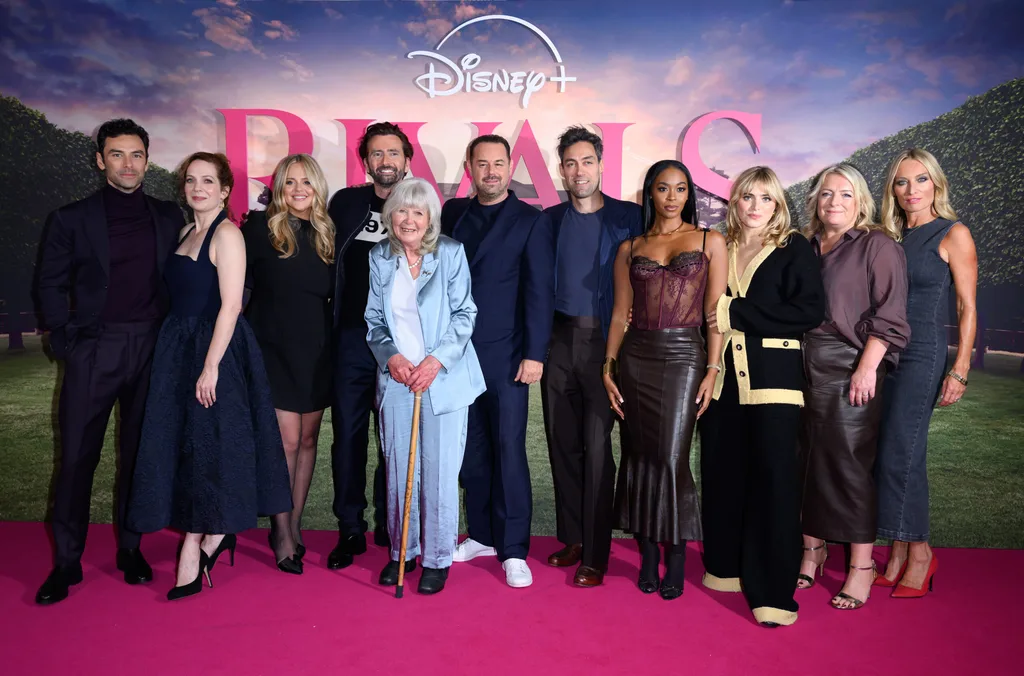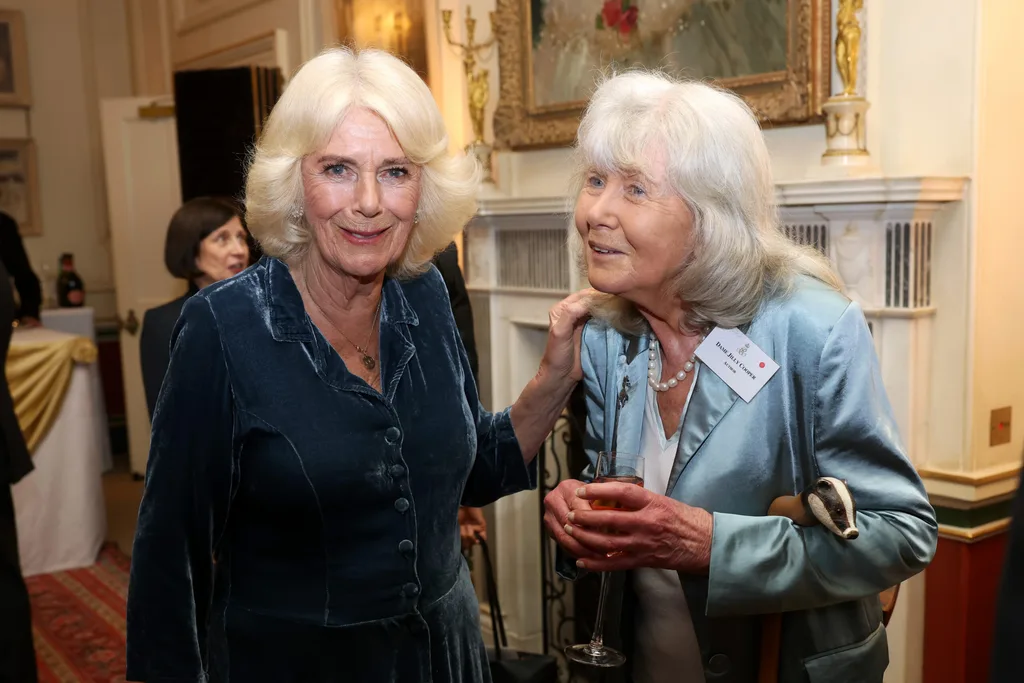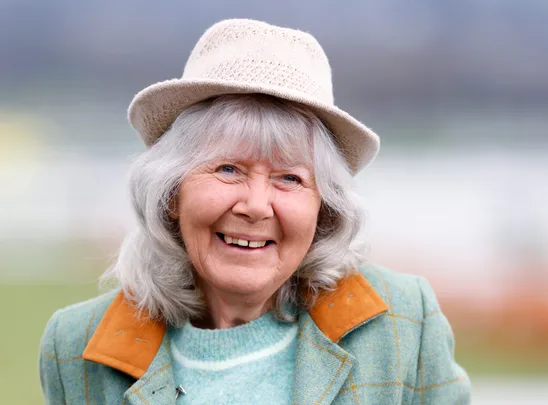With the sad news of Dame Jilly Cooper’s passing, we revisit this piece from the December 2023 issue of The Australian Women’s Weekly, written by Juliet Rieden.
Dame Jilly Cooper died on 5 October 2025, aged 88, after suffering a fall at her home in Bisley, Gloucestershire. Her family announced the death and described it as “unexpected”.
The British author was best known for writing the Rutshire Chronicles; Rivals, one of her most famous works, was adapted into a Disney+ TV series in 2024.
Queen Camilla, a longtime friend, paid tribute, calling Jilly a “legend” and a “wonderfully witty and compassionate friend.”
Following the news, Juliet wrote a touching tribute describing the following interview: “She was as much fun as I had expected her to be, but I hadn’t expected the warmth, candour and vulnerability.”
Read on for that interview.
Famous for writing page-turning ‘bonkbusters’ about Britain’s horsey set, author Jilly Cooper is shifting her gaze to soccer and, in a candid interview, talks about how attitudes to sex have changed, macho men and advice for her grandchildren.
You were born in 1937 and had a glorious childhood in the Yorkshire countryside, later moving to England’s south. How did it shape you as a writer?
Jilly: There were always writers in the family. My grandmother was a vicar’s wife, but she used to read novels the whole time: Jane Austen and the like. As soon as anybody came into the room, she would pretend to be mending and sewing, and then go back to her book when they left. I also had a relation who edited a newspaper, and my aunt Gwen used to write poems. She wrote one called I Have Raped the Chambers of Knowledge, and I remember her sending it to me. My mother was horrified; she rang Gwen and said, “You’re not to send Jilly poems like that!”
Where did your passion for horses come from?
Just after the war, I was mad about horses. I went to a riding school where we lived, and then we went to stay in Cornwall [on England’s south-west coast], where there was a lovely pony called Rufus. I persuaded my father to buy Rufus for me, and so I went back home, and Rufus arrived. I said to all my friends at school, “Come and see my pony, Rufus, and how wonderful he is.” I went into the field, and Rufus promptly bit me three times. He hadn’t been gelded. He was a stallion. He was absolutely vicious. Rufus was sold, and I got a pony called Willow, who was the big love of my life.
How close were you to your parents?
Very close. My father was very glamorous and a brigadier in the army. He got a first at Cambridge [University] for classics; then he changed to engineering because he wanted to go into the army. My mother, Elaine, was adorable, so beautiful. I had a brilliant childhood. I also had a brother, who I adored. He was three years older, and all my girlfriends used to come back from school and fall in love with him.
What were you like at school?
I was very naughty, really bad, known as “the unholy terror” – and only really good at English and history. I was supposed to be going to Oxford, and I persuaded my parents to send me to a crammer [to be tutored] at Oxford for the last two terms instead of staying at school. When I got to the crammer, I was surrounded by all these heavenly men at Oxford. So I just fooled around and failed the entrance exam.
Instead, you became a journalist at a newspaper.
Yes, on the Middlesex Independent in Brentford, in the docks. I covered everything: Police, firemen, even football … After a bit, I moved into public relations and was useless. I got sacked from 22 jobs.
That’s quite a record. What happened?
I couldn’t type accurately, and I used to giggle and fool about.

In 1968, you secured a column in The Sunday Times Magazine after you impressed the editor at a dinner party. The columns ran for more than a decade and were famously controversial.
Some people were furious. The post we received from readers was divided. People either thought I was a “silly b**ch”, “a stupid, stupid, stupid right-wing cow”, or else they liked what I wrote. I wasn’t actually that right-wing, because I switched around a lot [politically], but I think they used to get very irritated because I just wrote what I felt.
You recently published some of those columns in a book. Re-reading them, what were your thoughts?
I have to be honest: I thought they were very, very good. I wish I could write as well as that now. I would write about 15 drafts until they were perfect.
You interviewed British Prime Minister Margaret Thatcher. What was she like?
I adored her. I was usually very punctual, but that day I got stuck in a traffic jam in Whitehall and was late. I fell into her office in floods. She was so nice. She said, “My dear, don’t worry, don’t cry. Now, I gather you’d like a long interview, so why don’t you come home to my house in Chelsea next week and we can have a three-hour interview?” So I did, and she was absolutely sweet.
What would she make of the Boris Johnson years and of current Prime Minister Rishi Sunak?
I think she would have been slightly horrified because she was much more right-wing than they both are. Rishi is a fan of mine – did you know that? The other day, somebody asked him what he was reading, and he reeled off all my big books.
Your novels are still bestsellers. Dubbed “bonkbusters”, they’re full of philandering. Are you shocked by them now?
No, although possibly I went a bit too far. I re-read Riders the other day, and it was very wild. I think it was in Australia that a woman came storming up to me and said, “I’ve just read every single word of your disgusting books!”
Did the things you write about in Riders really happen? Was everyone actually having sex in the stables?
Oh, yes, I think so … They’re probably not now, because nobody’s allowed to, but definitely back then.
Your new book, Tackle!, features a ripped male torso in football shorts on the cover. What made you venture into the working-class world of soccer?
I’ve always liked football vaguely, but then I met a lovely man called Sir Alex Ferguson. He’s a very glamorous, powerful man in football, and he ran Manchester United for years. I sat next to him at this lunch, and he was so attractive and so friendly, I thought, “I’m going to write a book about football.” I guess I got carried away.
Your protagonist is still the “handsomest man in England”, Rupert Campbell-Black, who in previous novels is a former showjumper. How does he fit in?
Rupert is my hero, my glamour boy, and I wanted something new for him to do because he was very depressed. His wife, Taggie, is going through chemotherapy, and they have a lovely adopted daughter called Bianca, whose boyfriend, rising footballer Feral Jackson, was playing for Perth. He loves Australia because, he says, “Nobody knew I came from the gutter and she came from a very rich family.” Then, the couple come back to the UK to help look after Taggie, and Bianca persuades her father to buy the local football club so he can sign up striker Feral, who then takes the team to glory.

You’ve been writing sex scenes for five decades. Do you write about sex differently today?
The real problem is I’m 86 now and I’ve forgotten how to do it! That said, I don’t think there’s nearly so much of that sort of behaviour around now. People have sex less.
Why is that?
I honestly don’t know. But I think the whole macho thing of men being more insecure about their role and women being more powerful frightens men off. Men don’t come in and pursue women as they used to.
Times have changed, but that’s a good thing, isn’t it?
I don’t know. I believe in love, I really do. I love women and I love men, but I think of stallions and bulls and rams. In nature, the male is much more forceful and strong, isn’t he? Instinctively, I think it’s nice if men can look after women. I’m from that generation [who] had a very strong father and a lovely, strong husband. I know it’s not how people think now.
What was your life like before you were married?
I had a lovely time. I fell in and out of love, and then in and out of love again. I actually first met Leo, my lovely husband [who died in 2013 after living with Parkinson’s disease for 12 years], when I was at boarding school. Some girl was rabbiting on and Leo threw a strawberry jelly at her. He was a very good games player, and he hit her right in the kisser, which I thought was so cool. Later, he was a great friend of my main boyfriend, and so I knew him as a teenager too. Then I met him again after his marriage had broken up, and he asked me to marry him on the second date.
Did you always expect to marry and have a family?
That’s all I wanted, to fall in love and get married. I’m a Pisces, and all we want is love. But I couldn’t have children [after an ectopic pregnancy, Jilly was told she couldn’t conceive], so we adopted two heavenly children. I was 31 when we adopted Felix, and Emily came into our lives three years later.
Was that a difficult process?
Much easier than today. We went to this lovely place and got Felix and then Emily. It’s the luckiest thing that ever happened to me. I think one of the most important themes Tackle! looks at is how sad it is for children to go into care homes and never know a family, because it’s so difficult to adopt now. Dolphy, one of my heroes in the novel, was raised in a children’s home, and all he wants in life is a family.
Did your children always know they were adopted?
Yes. We told them early on, and they were absolutely wonderful. They live very near here now. They never, ever said anything beastly, like, “Oh, gosh, I’d like to go back to my real parents.”
You’ve written about the difficulties of being a second wife. How hard was it?
She [Diana, Leo’s first wife] was so beautiful and so sexy. She was the daughter of Leo’s housemaster at Radley [College], his boarding school, so all the boys were in love with her. I longed to be as beautiful as her. Once, I didn’t put any make-up on because I wanted to look natural and as if I wasn’t trying too hard. Then she turned up in black fishnet stockings and black leather, looking so sexy. I was jealous of her… but I got over it and we became friends.
You did go through a rough patch when Leo had an affair that hit the newspaper headlines. That must have been very upsetting for you.
It was absolutely awful, awful, awful… But he stayed with me and we had 53 years of good marriage. I got through it. I remember the wife of author Kingsley Amis came up to Leo at a party once and said, “Oh, what’s it like being Mr Jilly Cooper?” Leo was very much a macho man and very dominant. People admired him, and it must have been very difficult for him because people would always rush up to me at parties, rather than him.
Your husband used to say that marriage is like a job. Do you agree with that?
I thought that was rather depressing. But he was probably right, you do have to work at it, because there’s so much to do, bringing up children and earning money. We kept having to sell our house because we were terribly broke throughout our marriage. I wrote a book called Class, and that got us out of one trouble; then Riders saved us. We ricocheted through desperate times.

After living in London, your family moved to Gloucestershire, where many of the royal family live. Do you know any of them?
I know Queen Camilla and her ex-husband, Andrew Parker Bowles. I think the new King is wonderful, a lovely man. I also met the late Queen once or twice at horse things.
When did you first meet Camilla?
I actually met Andrew first in London because he helped me with Riders and my ex-showjumper character, Rupert Campbell-Black. [Andrew] was a brilliant horseman. Then I met Camilla at a dinner. She is great fun.
Do you think your writing style has changed over the decades?
I still write on my manual typewriter. [Jilly is a proud technophobe: She calls her trusty old typewriter “Monica” and doesn’t use the internet or even email.] But I don’t write as well as I used to. My memory isn’t as good as it was. I want to write about love, I like writing about love, and I’d like to write one more big love story.
What fascinates you about love?
It makes people happy. And unhappy and then happy again. It’s lovely being in love, isn’t it?
What do you like most about writing?
Mostly, I like writing my diary. I write in it every day.
How long have you kept a diary?
Forever. I say to my children, “Do you want me to burn them? The only thing is, if I don’t burn them and you publish them, they might make you quite rich. Or would you rather I burned them so you won’t be embarrassed?”
They say, “No, don’t you burn them, we’d rather have the money.”
Would they be shocked by them?
I hope not. They might be surprised.
You have always loved gossip. But is it different now with social media, which can be so toxic and cruel?
I love gossip, you’re right. All sorts of unlikely people getting it on with unlikely people… Thank God I don’t have social media. The anonymity is so wicked. If you say something, you ought to be brave enough to admit you said it.
Do you have any regrets about your own gossiping?
When I lived on Putney Common [in London], I used to walk and watch people, and The Common Years was based on what I saw. I did change [people’s] names and fix them up a bit. But I think I was quite nasty about one of them, and I wish I hadn’t been. I was also quite unkind to people sometimes in The Sunday Times column, but on the other hand, I was trying to make people laugh, so I went ahead with it.
You’re now a grandmother of five. Do you have any advice for your grandchildren?
Tackle! is dedicated to my grandchildren. Scarlett and Sienna are Felix’s children, and Acer, Lysander and Jago are Emily’s children. It sounds wet, but be kind and try to cheer people up. I recall writer Stephen Grellet’s words: “I expect to pass through this world but once. Any good thing, therefore, that I can do or any kindness I can show to any fellow creature, let me do it now.”
Will you write another football book?
No. Football is done.
Back to horses, then?
No. I’ve got an idea, but I’m being quiet about it at the moment…
This article originally appeared in the December 2023 issue of The Australian Women’s Weekly. Subscribe so you never miss an issue.


